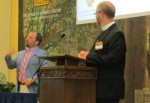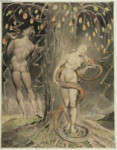Heather Walker Peterson continues our new series, Writing As a Spiritual Discipline. See the first piece in the series here, and see other work by Heather here. Telling the truth is a task entrusted to Adam as he names the animals; it is a responsibility of redeemed humankind which has been told the truth about itself in Jesus. Oliver O'Donovan My desire to write comes from an experience of reading. I read a transforming word. As I am transformed, I wish to influence transformation in a confusing and unjust … [Read more...] about The Spiritual Act of Naming: Truth Telling in Writing (Writing As a Spiritual Discipline Series)
Bearing the Image of God
James K.A. Smith on “Liturgical Discipleship”
Discipleship, becoming Christ-like, empowered by the Spirit to image God to the world is not magic. Nor is it merely intellectual. It's a matter of re-forming our loves, re-narrativing our identities, re-habituating our virtue. And that is centered in the practices of the people of God gathered by the Spirit around Christ's Word and the table. Love takes practice. Worship is our gymnasium. . . . -- Conclusion to James K.A. Smith's presentation Liturgical Discipleship: Worship as the Center of Spiritual … [Read more...] about James K.A. Smith on “Liturgical Discipleship”
Devotions: Bearing the Image of God (4)
“Just as we have borne the image of the man of dust, we shall also bear the image of the man of heaven” (1 Corinthians 15:49). The goal of a redeemed image of God in humans is complete and final restoration into the image of Christ. In Jesus as the “second Adam” we see human likeness to God as it was intended to be (1 Corinthians 15:45). Those “in Christ” therefore, are chosen by God to be “conformed to the image of his son” (Romans 8:29) so that, “when he appears we shall be like him” (1 John 3:2). This is not only … [Read more...] about Devotions: Bearing the Image of God (4)
Devotions: Bearing the Image of God (3)
The Scriptures tell us that as Christians we have a new nature that is “being renewed in knowledge after the image of its creator” (Colossians 3:10). And Paul points out in 2 Corinthians 3:18 we are progressively being transformed into the “same image,” or as The Message puts it, “our lives gradually becoming brighter and more beautiful as God enters our lives and we become like him.” Redemption is not just deliverance from eternal destruction or merely moral reformation. It involves a re-orientation of our thoughts, … [Read more...] about Devotions: Bearing the Image of God (3)
Devotions: Bearing the Image of God (2)
Genesis 3 tells the tragic story of the famous (or infamous) fall of the first humans into sin and corruption. Because of a choice that took them out of their assigned place in creation, under God but like God, their insistence on being “gods” distorted the image of God in them. Instead of derivative, yet creative knowledge, they disobeyed their “prime directive.” The penalty was not merely final physical death, but painful, hard-won work, struggling with creation instead of working with God's created order. Their … [Read more...] about Devotions: Bearing the Image of God (2)




